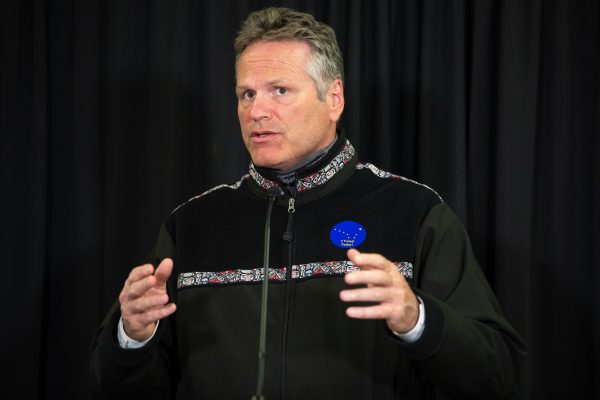
A state judge ruled on Friday that Gov. Mike Dunleavy’s vetoes of state funding for abortions from the court system’s budget were unconstitutional.
Anchorage Superior Court Judge Jennifer Henderson ruled that Dunleavy’s vetoes of $334,700 both last year and this year violated the separation of powers doctrine. She also voided the veto for the current budget.
Henderson wrote in her decision that: “in spite of this Court’s faith that the Alaska judiciary remains independent and committed to its essential function of deciding cases according to the rule of law, the Court must unfortunately conclude that in vetoing funds appropriated to the State appellate courts in express retaliation against the Alaska Supreme Court for its legal decision-making, the Governor violated the separation of powers doctrine.”
Dunleavy’s veto statements said both the Legislature and the executive branch are opposed to state funding of elective abortions, adding “the only branch of government that insists on State-funded elective abortions is the Supreme Court.”
The American Civil Liberties Union of Alaska and Anchorage residents Bonnie Jack and John Kauffman sued Dunleavy over the vetoes.
ACLU of Alaska Legal Director Stephen Koteff said Henderson’s decision will have lasting significance.
“Courts can’t operate under the thumb of the executive if they are to remain impartial,” he said. “In this case, we think every Alaskan is the winner. Every citizen needs to know that the courts will protect their constitutional rights without the fear that the scales will be tilted against them.”
Koteff said the case appeared to raise unique issues, adding that he’s not aware of any other cases where a governor or legislature reduced funding based on court decisions.
He added that the amount of money involved wasn’t important.
“Even the veto of a dollar of the court system’s budget would be significant, because it is symbolic,” of the executive branch asserting power over the judiciary, he said.
The veto came after the supreme court’s 2019 decision in State v. Planned Parenthood of the Great Northwest, which held that a state law and regulation defining when an abortion could be considered medically necessary to be eligible for Medicaid reimbursement violated the state constitution’s equal protection clause.
The Department of Law said in a statement that Dunleavy disagreed with Henderson’s ruling. The statement noted that Henderson did side with the state on one issue, ruling that the vetoes weren’t an unconstitutional reallocation between different parts of the state budget.
The department added that the state is reviewing its options regarding an appeal.
The abortion funding veto is one of the grounds cited by the campaign to recall Dunleavy from office. The recall campaign’s signature gathering slowed after the COVID-19 pandemic began.
Note: This story has been updated to include a response from the Department of Law.
Andrew Kitchenman is the state government and politics reporter for Alaska Public Media and KTOO in Juneau. Reach him at akitchenman@alaskapublic.org.




